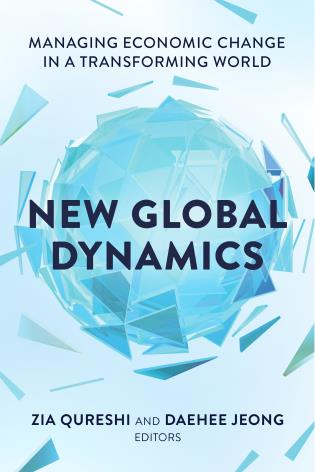This month’s session of the United Nations General Assembly commemorates the U.N.’s 80th anniversary. A key theme is reform and renewal of multilateralism—a very timely topic.
The global nature of many of today’s challenges—from disciplines governing trade and finance in an increasingly interconnected world to climate change—underscores the need for multilateral cooperation. Yet the multilateral arrangements meant to address these challenges are outdated and struggling. From an escalating trade war to a worsening climate crisis, there is an urgent need for reform.
We stand at a historical moment calling for a bold reimagination of multilateralism—to build a multilateral system fit for today’s challenges and reflective of contemporary economic and geopolitical dynamics.
Stresses in the multilateral economic system—the core elements of which (IMF, World Bank, GATT/WTO) date back to the Bretton Woods conference held in 1944—have been building for some time. Globalization and the scale and complexity of challenges requiring international cooperation have outpaced the system’s capacity to deliver, a mismatch often referred to as a widening global governance deficit. Multilateral institutions increasingly have been viewed as unrepresentative of a changing global economy and hampered by internal deficiencies and rigidities. From differing perspectives, discontent with the current system has grown across the Global North and South.
The context for multilateralism is now shifting much more profoundly, in ways that will require fundamental reform of the current system. The world is experiencing an epochal geopolitical transition. The postwar unipolar world order led by the United States is being challenged by the rise of China and other emerging economic powers. Economic nationalism is surging. Neoliberal policy paradigms are giving way to nationalist industrial policies and protectionism. The Trump administration’s “America First” agenda marks a sharp turn away from multilateral engagement. These geopolitical shifts create serious risks of geoeconomic and geofinancial fragmentation and fracture of global economic governance.
The digital revolution and artificial intelligence (AI) are reshaping trade and finance. Digital trade and digitally deliverable services are the new frontier of international commerce, posing new challenges for a trading system built largely around physical goods. New financial products and mechanisms have major implications for international financial and monetary arrangements. The powerful new technologies, holding enormous promise but also risks, require governance frameworks demanding international coordination.
Climate change presents a huge restructuring challenge. It has pushed the provision of global public goods to the forefront of the international agenda. The COVID-19 pandemic also underscored the role of global collective action on shared challenges that transcend national borders. The current multilateral development architecture was designed predominantly around country-level engagements. Preserving global commons was not a major part of its initial design but must now become central to the mission.
We stand at a historical moment calling for a bold reimagination of multilateralism—to build a multilateral system fit for today’s challenges and reflective of contemporary economic and geopolitical dynamics. Fixes to the legacy institutions may no longer be enough. We must also ask which ones may have outlived their usefulness and should be retired, and what new institutional forms may be needed. Reform of individual parts of the multilateral system must be informed by a new, overarching vision for multilateralism, its focus and structure.
There are competing visions of multilateralism today, from the expansive to the minimalist. What is clear is that, in the face of today’s political realities, multilateralism must have a narrower, sharper focus on areas where global collective action is truly necessary, such as global public goods and core disciplines against beggar-thy-neighbor policies—climate protection, global public health, global financial stability, essential rules for international trade and finance, and AI safety.
The institutional architecture of multilateralism must be rethought. One important question is whether existing multilateral development banks can be repurposed to focus on the provision of global public goods or whether new institutions are needed. The erosion of the WTO’s role raises the issue of how governance of world trade should evolve, especially in a fragmenting trade system. Fragmentation raises similar issues for institutions and frameworks underpinning global financial stability. Management of AI risks presents a new challenge for international cooperation—and in an environment of major power rivalry for technological supremacy. A cross-cutting reform issue is how governance of multilateral institutions should be redefined to make them more representative of today’s world and enhance their legitimacy—and, therefore, effectiveness.
The world has recently seen a shift away from global institutions to alternative arrangements ranging from bilateral mechanisms to a variety of plurilateral groups of regional or like-minded countries. Going forward, this trend toward more diverse institutional arrangements is likely to continue, especially as geopolitics drives a reconfiguration around competing powers. An important question will be how such variable institutional geometry can be best designed to ensure collective ability to meet common future challenges.
A multipolar world, with more assertive nationalism and changing policy paradigms, will be characterized by greater preference and policy heterogeneity across nations. Cooperation may be based more on shared interests than shared values. An implication of these dynamics is that multilateral frameworks, while anchored in agreed core principles, will need to be more flexible and allow wider leeway to national policies.
A vital complement to multilateral reform is better management of global interconnectedness at the national level. Countries must do a better job of managing the necessary restructuring within their economies, especially addressing distributional consequences. Failure to address these consequences and ease economic and social adjustment has been the key factor stoking a public backlash against international integration—and the institutions associated with it.
Fundamental reform of the multilateral system may seem daunting in a time when multilateralism is in crisis and faces fraught geopolitics. But as the saying goes, a crisis is a terrible thing to waste. The “United Nations at 80” is an opportune moment for the international community to commit to reshape and revitalize multilateralism for the 21st century.
The Brookings Institution is committed to quality, independence, and impact.
We are supported by a diverse array of funders. In line with our values and policies, each Brookings publication represents the sole views of its author(s).







Commentary
Rethinking multilateralism for a new era
September 22, 2025